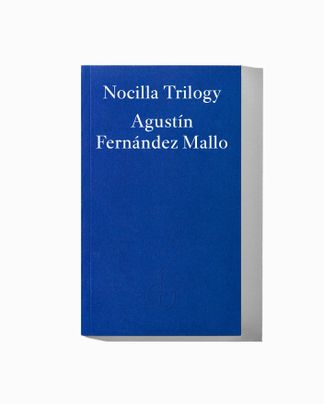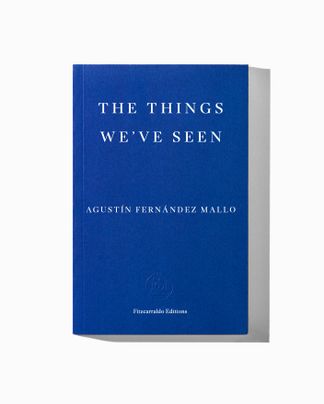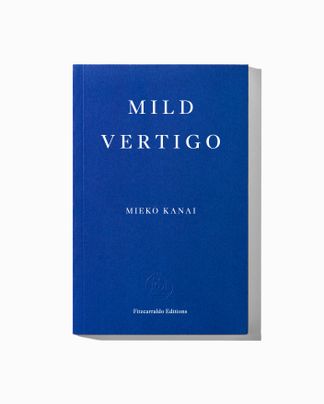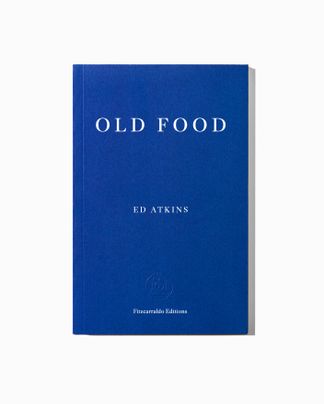A landmark in contemporary Spanish literature, Agustín Fernández Mallo’s Nocilla Trilogy – Nocilla Dream, Nocilla Experience, and Nocilla Lab – presents multiple narratives of people and places that reflect the world in the digital age. In this third, standalone volume, we find the author bedridden in Thailand after being knocked down by a motorbike, an accident which fortuitously gave him the time and space to begin writing the trilogy. Seven years later, when he travels with his girlfriend to Sardinia, they come across an old penitentiary that has been converted into an agritourism site. In a tour de force reminiscent of Adolfo Bioy Casares’ The Invention of Morel, a story of suspense and exploration unfolds in the uninhabited hotel. From autofiction to horror story to graphic novel, Nocilla Lab is a fitting conclusion to one of the most daring literary experiments of the twenty-first century.
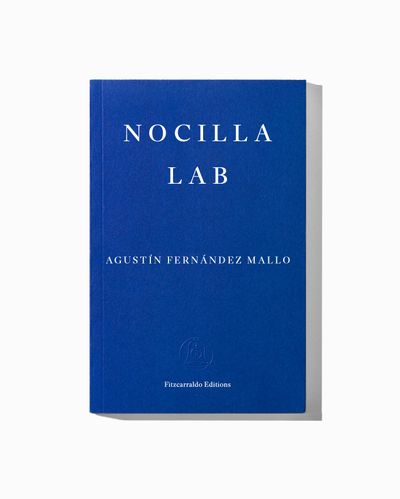
Nocilla Lab
Translated by Thomas Bunstead
Published 16 January 2019 | French paperback with flaps, 192 pages
Winner of the 2022 Europese Literatuurpijs
Nocilla Lab
Translated by Thomas Bunstead
I
AUTOMATIC SEARCH ENGINE
True story, very significant too, a man returns to the deserted city of Pripyat, near Chernobyl, a place he and the rest of the populace fled following the nuclear reactor disaster 5 years before, walks the empty streets, which, like the perfectly preserved buildings, take him back to his life in the city, his efforts as a construction worker here in the 1970s were not for nothing, comes to his own street, scans the tower block for the windows of his former flat, surveying the exterior for a couple of seconds, 7 seconds, 15 seconds, 1 minute, before turning the camera around so that his face is in the shot and saying, Not sure, not sure this is where my flat was, then gazes up at the forest of windows again and says, not to camera this time, I don’t know, it could be that one, or that one over there maybe, I just don’t know, and he doesn’t cry, doesn’t seem affected in any way, couldn’t even be said to seem particularly confused, this is an important story concerning the existence of likenesses between things, I could have stuck with this man, could have looked into his past, how he was living now, which patron saint’s day he was born on, his domestic dramas, the amount of millisieverts or gamma, alpha and beta radiation his organism had been subjected to in the past, the mutation of his body tissues, even, or probed his involuntary impulse to erase his own footsteps, which has led him both to forget the location of his old flat and not to feel any urge to go in and look over his old belongings, like the slice of Russian cow there in the pan, the table laid for dinner, the unmade bed, the TV off though the power button is ON, the alarm clock still going strong because he’d put alkaline batteries in it, the nuclear-waste container being used as an ashtray, everything precisely as he left it 5 years before, yes, I could carry on tracking this man, but I’m not going to, the truth of the matter is I’ve never been a follower of men, any men, it’s only women I’m interested in, ‘women’ in every sense of the word, the only men I’ve ever been interested in are those who have struck me as both entirely different from and better than me, those I consider ‘cases’, ‘clinical cases’, as the writer Emil Cioran had it when discussing a class of pathologically brilliant person, and it’s in this regard, the ‘clinical case’ regard, that I have always hoped to find in someone those same things that set the Replicant apart, the perfect being, existing on the edge of humanness, not beyond that edge but certainly not this side of it either, exactly on the biological frontier, such thoughts are absurd given that in the end we are all more or less identical, not identical in the way, for instance, that 2 photons are identical, physics tells us photons are indistinguishable, but in the sense of ‘very much alike’, and this is why aspiring to such difference, any hope of ever becoming a ‘clinical case’ oneself, turns out to be an infantile stance, though a desire to be different from other people can still help you to take action, to progress, to work through stress and anxiety, to be, that is, alive in a sense quite different from the ‘being alive’ idea peddled by the bland Eastern philosophies, because stress promotes entropy, disorder, life, and one travels to different countries and sees there very different things flora- and fauna-wise, customs- and appearances-wise, all the things that distinguish races and cultures, and yet, sooner or later, one comes to the undeniable conclusion or formulation of what might even be a law, namely that everything, looked at in sufficient detail, is identical to its counterpart on the far side of the world: zoom in and the leaf of a scrub plant in Sardinia is the same as that of an Alaskan pine tree, the skin pores of a Sudanese person are identical to those of an Inuit, and there really is nothing between a Buddha figure in Bangkok and a statuette of Christ in Despeñaperros, Jaén, and so it is with everything, because of another law both general and true: the tourist goes abroad and identifies with the things he or she finds there only because they call to mind something familiar, something that, without being exactly the same, is somewhat the same, the Replicant from Blade Runner, and all of this has a great deal to do with what we understand by the word frontier, by the overlapping of surfaces, because it would be monstrous to happen upon something absolutely new, it would be nightmarish and unbearable, just as two absolutely identical beings would be, and so we look for arguments to take us beyond this paradox.
(…)
‘With the tools of a scientist and the nose of a poet, Fernández Mallo dissects the materials he finds anywhere and everywhere (libraries and garbage dumps, real cities and virtual realities, audiovisual archives and personal memories) to construct, from these fragments, thoughts, and classifications, collages that could only be the fruit of illogic, dreams, accidents.’
— Jorge Carrión, 4Columns
‘Sometimes puzzling, even inexplicable, but rich. Just the thing for fans of Cortázar – and Borges, too.’
— Kirkus Reviews
‘Reading Nocilla Lab is an enjoyable challenge, a mental exercise that moves between formats and genres in the most unpredictable ways.… The different layers Agustín Fernández Mallo puts together make up a literary experience that will no doubt be an unforgettable one for whoever embarks on this journey.’
— Laila Obeidat, The London Magazine
‘Think of [The Nocilla Trilogy] as three novels at the edge of the form, their manifold narratives folded into each other: all highly imaginative, all fairly unhinged, all methodically interrupted by a range of scientific, theoretical and literary quotations.’
— Kevin Breathnach, London Review of Books
‘Blending different genres and forms of expression into a captivating multi-layered story, Nocilla Lab is not just an interesting literary experiment but also an exquisite work that stays with the reader for a long time.’
— Alice Piotrowska, Pendora
‘Why bother asking whether or not the novel can any longer capture the times we live in? The question itself is outdated. We have in front of us the novel that has captured them.’
— MacKenzie Warren, Splice
Praise for the Nocilla Trilogy
‘It is in these pages that we see a strange and original sensibility at work – one that combines a deep commitment to the possibilities of art with a gonzo spirit and a complete absence of pretention – and get the chance to spend some intimate time in its company.’
— Christopher Beha, Harper’s
‘To call the works that comprise Agustín Fernández Mallo’s Nocilla Trilogy wide-ranging wouldn’t be inaccurate, but it would miss the mark in terms of just how much these books manipulate and revise concepts of language and narrative. They fall somewhere between Ben Marcus’s The Age of Wire and String and Olga Tokarczuk’s Flights in their unpredictability, their sense of risk, and the utter joys that can arise from reading them.’
— Tobias Carroll, Lit Hub
‘An encyclopedia, a survey, a deranged anthropology. Nocilla Dream is just the cold-hearted poetics that might see America for what it really is. There is something deeply strange and finally unknowable to this book, in the very best way – a testament to the brilliance of Agustín Fernández Mallo.’
— Ben Marcus, author of The Flame Alphabet
‘The most original and powerful author of his generation in Spain.’
— Mathias Enard, author of Compass
‘By juxtaposing fiction with non-fiction … the author has created a hybrid genre that mirrors our networked lives, allowing us to inhabit its interstitial spaces. A physician as well as an artist, Fernández Mallo can spot a mermaid’s tail in a neutron monitor; estrange theorems into pure poetry.’
— Andrew Gallix, Independent
‘Nocilla Experience is the best novel I read in 2016. Thrillingly, incandescently brilliant.’
— Stuart Evers, author of If This is Home
‘Like having multiple browser windows open, and compulsively tabbing between them.’
— Chris Power, Guardian
‘A wonderful work of avant-gardist fiction – in the line of David Markson, Ben Marcus.’
— Germán Sierra, Asymptote
Agustín Fernández Mallo was born in La Coruña in 1967, and is a qualified physicist. In 2000 he formulated a self-termed theory of ‘post-poetry’ which explores connections between art and science. His Nocilla Trilogy, published between 2006 and 2009, brought about an important shift in contemporary Spanish writing and paved the way for the birth of a new generation of authors, known as the ‘Nocilla Generation’. His essay Postpoesía: hacia un nuevo paradigma was shortlisted for the Anagrama Essay Prize in 2009. In 2018 his long essay Teoría general de la basura (cultura, apropiación, complejidad) was published by Galaxia Gutenberg, and in the same year his latest novel, The Things We’ve Seen, won the Biblioteca Breve Prize. In 2022, he was awarded the prestigious Eugenio Trías Essay Prize for La forma de la multitud. The Book of All Loves is his fifth book with Fitzcarraldo Editions.
Thomas Bunstead is a writer and translator based in East Sussex. He has translated some of the leading Spanish-language writers working today, including Yuri Herrera, Enrique Vila-Matas, and Juan Villoro, and his own writing has appeared in The White Review and the Times Literary Supplement. He is an editor at the translation journal In Other Words.

